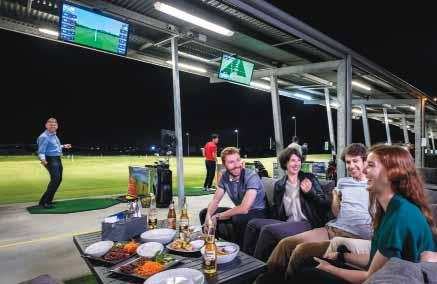
6 minute read
Guiding Sport through the Next Decade
In March 2022, Squash Australia announced they would be launching a new national registration and competition management platform with revolutioniseSPORT
Emily Moore, Daniela Zapata, Anne-Sophie van der Sanden and Alex Mednis consider key trends that will infl uence sport in the years to 2032
Advertisement
As we move toward the 2032 Olympics in Brisbane it is an appropriate time to consider the megatrends that will influence and shape the sporting industry over the next decade.
The future will be personalised, and the four megatrends considered in this article are built around the core understanding that consumers want to deal with sports on their own terms, rather than those of the sport.
This is a fundamental shift from the early 2000s, where the experience was firmly in control of the sport.
To build a successful sporting ecosystem prior to 2032, sport needs to understand the following trends and more importantly, act now.
Personalisation Have you ever wondered how you can be discussing exotic travel destinations with friends, and disturbingly specific advertisements appear within a day or so on every website? This is the world of artificial intelligence, machine learning and personalisation.
Irrespective of whether it relates to advertisements, tailored content or individualised services, personalisation allows for delivering contextual member experiences that better suit consumers on their terms.
Sport lags behind almost all other industries when it comes to personalisation, with very few sports using anything of the kind in their marketing strategies. However, in a world where attention span is shorter and the average consumer is constantly bombarded, gaining brand attention out of the white noise is imperative.
For sport to succeed, personalisation must be weaved into club activities from the grassroots to the national level. Three key areas in which personalisation can improve club operations include membership loyalty, behavioural and demographic cross-selling, and location data.
Gamification Whether we are setting up a new mobile phone or taking suggestions from LinkedIn on how to ‘complete’ the profile we have had set up for years - a setup checklist awaits! And not just any checklist, but one that gives us shiny green ticks and ‘points’ for enabling settings and handing over more information in return for each reward.
However you look at it, most of our lives are governed by clubs, frequent flyer memberships and ‘reward programs’ that see us happily trade our behaviour and data in exchange for the positive reinforcement of completing a series of micro-requests.
Gamification aims to entice users to continue using a product or purchasing a service by completing specific tasks and rewarding them for doing so.
Across the sporting industry: badges, leaderboards, points or rewards, social interactions, stories and incentives are all standard implementations of gamification. And when executed effectively, the benefits of gamification can reach far and wide to all members of your organisation, from fans to participants.
The evolution of membership models Traditionally, seasons and membership have been consistent within the sporting industry. However, as the demands of members change, sports must adapt their membership models to suit an evolving member base.
Membership models now extend far beyond the traditional seasonal or subscription-based memberships, with organisations offering alternate options such as day or game memberships, plus pick up and play or come and try options.
Mixing and matching is also becoming increasingly common as organisations aim to offer versatility to members. While some membership models can be offered in parallel (such as seasonal and day), others are incompatible (such as seasonal and subscription), and it is important to pick and choose methods that are complementary.
As society shifts and sport is changing, sports are competing against each other as well as against other hobbies and activities. We are entering a world that is on the consumer’s terms, not the sports.

Truth and the rise of the API (Application Programming Interface) Over the past decades, sports have slowly shifted from paperbased systems to the use of online software platforms.
As the digital world continues to move forward in leaps and bounds, sports must now focus on establishing a singular source of truth and minimising the use of multiple systems that operate independently of each other.
For sporting organisations, finding that one source of truth and investing in a CRM that has capabilities for integrations to extend functionality will result in significant cost savings, opportunities for automation, and improved organisation and efficiency.
It will also allow organisations to reap the benefits of common integrations such as online payment gateway providers, learning management systems, competition software, survey tools, EDM providers and loyalty programs.
A functional and connected software platform can be a defining part of an organisation’s long term success - something that should be an ever-growing focus over the next decade.
Over the next decade, sports need to be responsive to all four of these megatrends to stay competitive, and to grow toward 2032. Emily Moore is Chief of Staff, Daniela Zapata is Special Projects Coordinator, Anne-Sophie van der Sanden is Platform Specialist and Alex Mednis is Managing Director of revolutioniseSPORT. Mednis is also Chief Executive of SportsGrid and General Manager - Business Development for the Australian Sports Professionals Association (ASPA). Article based on a revolutioniseSPORT white paper. For more information on these megatrends go to www.revolutionise.com.au/our-impact/

Image: Golf Central in Brisbane
Pitching to Entertain
A $60 million PlayGolf Fund has been launched to redevelop under-performing courses into sport entertainment zones.
The Fund has been launched by Mulpha Australia, which is providing the equity, and backed by Avid Sports Management and Golf Australia.
The PlayGolf Fund aims to secure long-term leases of at least 20 years on under-performing golf courses or driving ranges and to redevelop them into sport entertainment and attraction zones.
Mulpha, the Australian arm of Kuala Lumpur-listed Mulpha International, has committed up to $60 million to golf courses and driving ranges seeking to reposition existing sites to cater for a broader target audience and combine golfing facilities with hospitality and potentially other entertainment and leisure attractions. This investment will deliver state of the art facilities with widespread appeal in their communities.
Mulpha Chief Executive, Greg Shaw advised “the PlayGolf Fund partners have a shared goal to encourage more people regardless of age, gender or skill level to play and enjoy golf in a more accessible and entertaining way.
“In recent years we have seen many traditional public and member golf facilities and driving ranges struggle to find the combination of capital, development capability and specialised operational expertise to transition towards becoming more enticing integrated golf, hospitality and entertainment venues.
“Together with Avid Sports and Golf Australia, we have developed the PlayGolf Fund, a comprehensive solution for golf venues. We are pleased to provide the significant investment to private and public facility owners in return for long term operational leases.”
James Cooper, Managing Director of Avid Sports - which runs Golf Central in Brisbane and will handle the operational element of the venture - said the sport must evolve to attract new participants and that “entertainmentbased golf” was part of the game’s future adding “the PlayGolf Fund can assist in the delivery of far superior public facilities with less commercial and financial risk by bringing investment and creating alternative formats to appeal to the broader golfing community.”
The PlayGolf Fund is actively seeking expressions of interest to reinvigorate the participation, membership and utilisation of golf facilities on a sustainable and commercial basis with applications sought from local government authorities and membership-based clubs.
First round applications to access the $60 million funding package closed on 31st March 2022 with subsequent rounds to be considered thereafter. Details on PlayGolf Fund and how to apply can be found at www.playgolffund.com.au














